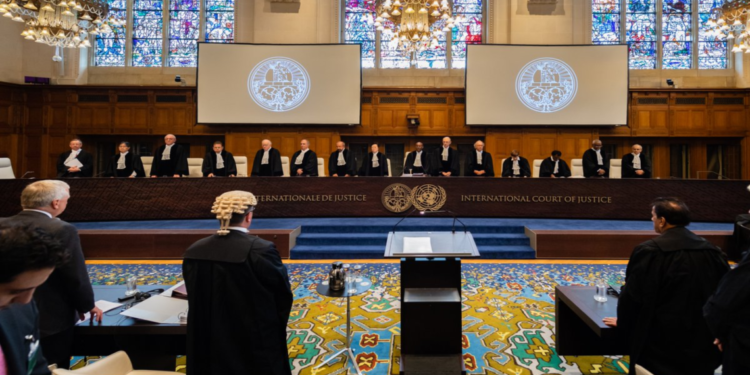British colonialism in Africa must be ended by returning the Chagos Archipelago to Mauritius, the International Court of Justice was told on Monday.
In submissions before the highest judicial organ of the UN — which has its seat in the Peace Palace in The Hague, former Mauritian president and prime minister Sir Anerood Jugnauth QC, asked that the United Kingdom of Great Britain and Northern Ireland immediately give back the Chagos Archipelago, the last British colony in Africa, to Mauritius, to which it historically belongs. The population, which was deported between 1967 and 1973, must be allowed to return immediately, thus putting an end to the “immense suffering” of being far from the native island and the graves of the ancestors.
Sir Anerood recalled that Mauritius had been subsequently a Dutch, French and British colony from 1638 till independence in 1968, and over the centuries, the Chagos Archipelago had always been part of Mauritius. It was only in the run-up to independence in the 1960s that London decided to split the Chagos islands off Mauritius, with the intent to put one of the islands, Diego Garcia, at the disposal of the United States of America for the construction of an important military base.
The 88-year-old Sir Anerood pointed out that he is the last surviving participant of the “Mauritius Constitutional Conference” in Lancaster House in London in 1965, where the future of the British colony was to be decided. Alongside the official sessions, he added, there were smaller secret private meetings on “defence matters” to which only five members of the Mauritian delegation were invited, among whom were then Prime Minister Sir Seewoosagur Ramgoolam.
Sir Anerood was not aware at the time of those secret meetings. He was only told later about them and of the “immense pressure” that was put on the small group around the colony’s prime minister. Then British Prime Minister Harold Wilson went into a meeting with Sir Seewoosagur with a colonial office note that suggested that he “frighten Sir Seewoosagur with hope”. Hope for independence that is, but only if the delegation of Mauritius would agree to the “excision” of the Chagos Archipelago.
According to Mauritius, the dismemberment of the colony, with the new colony “so-called BIOT” being created, as Mauritius put it (BIOT stands for British Indian Ocean Territory), violates the principles of decolonization and self-determination of peoples. Consequently, Mauritius is asking the ICJ judges to find that the Chagos islands must be returned “immediately” and that the population must be allowed to return without delay.
Mauritius showed the video-taped testimony of one of the 1,500 deported men, women and children on the screens in the Great Hall of Justice. Marie Liseby Elysé stressed that “everyone had a happy life” on the “paradise island” where she was born. But then the colonial administrators told her and her fellow islanders that they had to leave; houses and personal belongings had to be left behind; they could take only some clothes on a ship where they were treated like “animals” or “slaves”.
Her emotional testimony visibly moved diplomats, judges and other lawyers in the Great Hall of Justice at the Peace Palace.
The United Kingdom delegation agreed that the treatment of the Chagossians had been “shameful and wrong”. But it also contended that Mauritius had lawfully agreed in 1965 to the detachment of the Chagos Archipelago, and that the harmed inhabitants had been compensated through payments in 1972 and 1982 that constitute “full and final settlements of the claims”.
At the International Court of Justice, there are two kinds of proceedings: contentious proceedings between states that lead to binding judgments of the principal judicial organ of the United Nations. The ICJ also gives advisory opinions on legal matters at the request of UN organs. The Chagos matter has been brought before the ICJ as a request for an advisory opinion by the UN General Assembly, at the request of Mauritius and the African Union. The UK contends that the character of the issue is more that of a bilateral dispute, that should be brought before the ICJ as a contentious case. Therefore London is asking the ICJ not to give an advisory opinion.
Mauritius has asked the ICJ judges to say that the decolonization of Mauritius has not been completed and that the Chagos islands must be decolonized “immediately”, as the Court ruled in the past about the decolonization of Namibia — which was then under the illegal rule of the apartheid regime in South Africa.
Mauritius recalled that President Emmanuel Macron of France, during a recent visit to Algeria, admitted that colonialism had been a crime against humanity.







